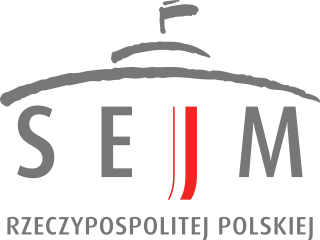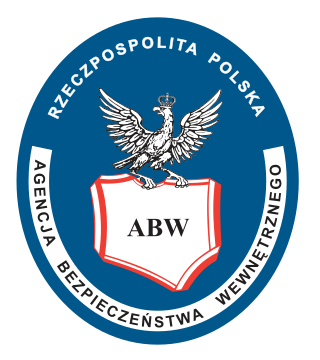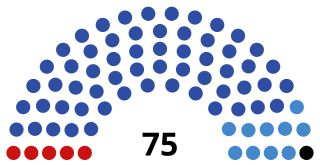
The Sejm, officially known as the Sejm of the Republic of Poland, is the lower house of the bicameral parliament of Poland.

The president of Poland, officially the president of the Republic of Poland, is the head of state of the Republic of Poland. Their rights and obligations are determined in the Constitution of Poland. The president jointly partakes in the executive branch with the parliamentary Polish government. In addition, the president has a limited right to dissolve parliament, can veto legislation, represents Poland in the international arena, and is ceremonially the commander-in-chief.
The government of Poland takes the form of a unitary semi-presidential representative democratic republic, whereby the president is the head of state and the prime minister is the head of government.

Voivode, also spelled voivod, voievod or voevod and also known as vaivode, voivoda, vojvoda or wojewoda, is a title denoting a military leader or warlord in Central, Southeastern and Eastern Europe in use since the Early Middle Ages. It primarily referred to the medieval rulers of the Romanian-inhabited states and of governors and military commanders of Poles, Hungarian, Balkan, Russian people and other Slavic-speaking populations.

The Verkhovna Rada, officially the Verkhovna Rada of Ukraine, is the unicameral parliament of Ukraine.
The Council of Three was a collegial body created by the Polish Government in Exile in 1954 with prerogatives of the President of Poland. It consisted of three members of the government chosen by the Council of National Unity, a rump parliament in exile.
The Cabinet of Ministers of Ukraine, commonly referred to as the Government of Ukraine, is the highest body of state executive power in Ukraine. As the Cabinet of Ministers of the Ukrainian SSR, it was formed on 18 April 1991, by the Law of Ukrainian SSR No.980-XII. Vitold Fokin was approved as the first Prime Minister of Ukraine.

The Council of Ministers of the Republic of Poland is the collective executive decision-making body of the Polish government. The cabinet consists of the Prime Minister, also known as the President of the Council of Ministers, the Deputy Prime Minister, who acts as a vice-chairman of the council, and other ministers. The current competences and procedures of the cabinet are described between Articles 146 to 162 of the constitution.

The Foreign Intelligence Agency (Polish: Agencja Wywiadu is a Polish intelligence agency tasked with the gathering of public and secret information abroad for the Republic of Poland.

The Internal Security Agency is Poland's domestic counterintelligence and security agency. The ABW is responsible for analyzing, reporting and preventing threats to Poland's internal security, including terrorism, foreign espionage, arms smuggling, drug trafficking, organized crime, corruption and economic coercion. Its powers include arresting individuals, conducting searches and investigations, and combating terrorism with a specialized armed anti-terrorist force.

The Provisional Government of the Republic of Poland was created by the State National Council on the night of 31 December 1944.

The NATO Parliamentary Assembly serves as the consultative interparliamentary organisation for the North Atlantic Treaty Organization (NATO). It consists of delegates from the parliaments of the 32 NATO member countries as well as from associate and partner countries. Its current President is Gerry Connolly from the United States, elected as Acting President in 2024 after former president Michał Szczerba was elected to European Parliament. Its current Secretary General is Ruxandra Popa, who has been in this position since January 2020.

The Ministry of Public Security, was the secret police, intelligence and counter-espionage agency operating in the Polish People's Republic. From 1945 to 1954 it was known as the Security Office, and from 1956 to 1990 as the Security Service.

The Senate of Kazakhstan is the upper house of two chambers in Kazakhstan's legislature, known as the Parliament (Parlamenti). The Senate is composed of elected members: two from each region and two from three municipalities which are Almaty, Astana, and Shymkent.

The State Council of Crimea is the parliament of the Russia-administered Republic of Crimea. It claims to be a continuation of the 'Supreme Council of Crimea' following a vote by the Ukrainian parliament to dissolve the Supreme Council of Crimea. The Parliament is housed in the Parliament building in the centre of Simferopol.

The National Security and Defense Council of Ukraine is the coordinating state body of the executive power under the President of Ukraine on issues of national security and defense.

The president of Ukraine is the head of state of Ukraine. The president represents the nation in international relations, administers the foreign political activity of the state, conducts negotiations and concludes international treaties. The president is directly elected by the citizens of Ukraine for a five-year term of office, limited to two terms consecutively.

National Security Bureau is a Polish government agency executing the tasks given by the President of the Republic of Poland regarding national security. The Bureau serves as the organizational support to the National Security Council.

Romuald Szeremietiew is a Polish politician, columnist, habilitated doctor of military sciences and associated professor at the Academy of National Defense and the War Studies Academy. He was a founding member of the Confederation of Independent Poland, an anti-communist, Sanationist independence movement. He became a member of the Sejm in 1997 and served as the Minister of National Defense in 1992 and Vice-minister in 1997.
State Defense Committee was a government organization which existed from 1959 in the Polish People's Republic and continued to exist following the demise of the communist system, until 2002 when it was dissolved.
















